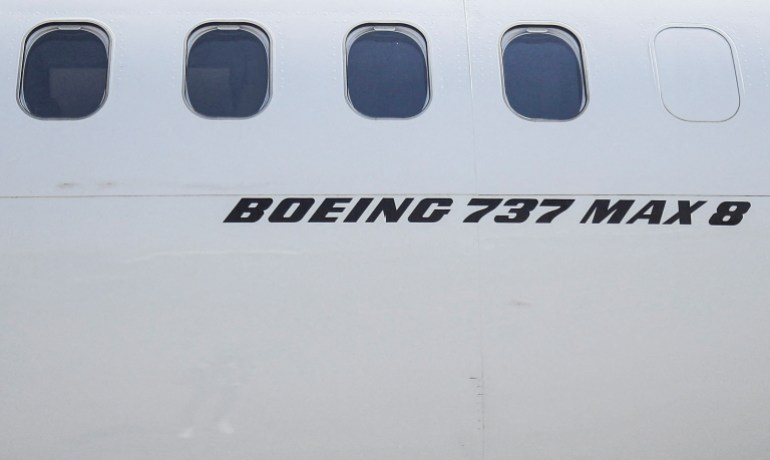Medan, Indonesia – For Neuis Marfuah, the current near-catastrophe involving a 737 Max aircraft flown by Alaska Airways introduced again painful recollections and anger.
Her daughter, 23-year-old Vivian Hasna Afifa, was killed when Lion Air Flight 610 crashed into the Java Sea in Indonesia on October 29, 2018, killing all 189 individuals on board.
“How could this have happened? I can’t stop thinking about it,” Marfuah advised Al Jazeera.
On Thursday, the US Federal Aviation Administration (FAA) stated that it had accredited the Boeing 737 Max 9 to return to service after greater than 170 of the plane had been grounded on January 6, the day after a panel on Alaska Airways Flight 1282 blew out at 14,000 toes with 177 individuals on board.
The FAA’s “exhaustive” assessment gave the watchdog the arrogance to “proceed to the inspection and maintenance phase”, FAA administrator Mike Whitaker stated in a press release that outlined “unacceptable” high quality assurance points.
Nobody was killed or injured within the incident, however for Marfuah, the information of the near-disaster was arduous to bear.
“It should have been enough after the events in Indonesia and Ethiopia to decide to stop operating the Max 737 aircraft once and for all,” Marfuah stated.
Lower than 5 months after the Lion Air crash in Indonesia, Ethiopian Airways Flight 302 crashed six minutes after takeoff from Addis Ababa Airport en path to Kenya, killing all 157 individuals on board.
Following the Lion Air and Ethiopian Airways crashes, a US congressional report discovered that Boeing operated a “culture of concealment” and that the 737 Max planes had been “marred by technical design failures”, together with points with the Maneuvering Traits Augmentation System (MCAS).
MCAS is a flight-stabilisation programme on newer 737 Max fashions that’s designed to robotically cease a aircraft from going right into a stall, though this was not clearly communicated to pilots flying the planes.
On Lion Air Flight 610, a sensor on the skin of the aircraft malfunctioned and indicated that the nostril of the aircraft was too excessive and that the plane was vulnerable to stalling, inflicting the MCAS to robotically drive the aircraft right down to keep away from a possible stall and crash into the ocean.
MCAS additionally malfunctioned on Ethiopian Airways Flight 302, prompting Boeing to make modifications in order that it now “operates in unusual flight conditions only and now relies on two sensors, activates only once and never overrides pilots’ ability to control the airplane”.

After an investigation into the near-miss involving Alaska Airways Flight 1282, the airline discovered that the panel that blew off had been eliminated, repaired and reattached by Boeing mechanics.
Alaska Airways CEO Ben Minicucci stated in an interview aired by NBC Information on Wednesday that an in-house inspection discovered that “many” of the 737 Max 9 plane had free bolts.
“Really, an airplane exploded in mid-air in one section,” Dennis Tajer, spokesperson for the Allied Pilots Affiliation union and a 737 Max 8 pilot with greater than three a long time of expertise, advised Al Jazeera.
“It was an explosive depressurisation of the plane, which is all-encompassing and terrifying. This has taken trust in Boeing and absolutely crushed it again.”
Within the three weeks because the Alaska Airways incident, Boeing has misplaced practically one-fifth of its market capitalisation.
After a gathering with US senators on Wednesday, Boeing CEO Dave Calhoun advised reporters that the corporate doesn’t “put airplanes in the air that we don’t have 100 percent confidence in”.
Anton Sahadi, whose spouse misplaced her two 24-year-old cousins, Riyan Aryandi and Ravi Andrian, on Lion Air Flight 610, described the newest incident involving the Boeing 737 Max incident as “saddening”.
“As a family member of and spokesperson for the victims of the Lion Air plane crash, I was very concerned to hear the Alaska Airlines news, remembering that 189 people were victims of the Lion Air crash in Indonesia,” Sahadi advised Al Jazeera.

Like Tajer, Sahadi stated the newest incident had shaken his belief in Boeing’s planes.
“I am increasingly doubtful about the 737 Max planes and I think there must be serious action taken by the aircraft certifier before they are ready to be sold and used commercially,” he stated.
“It is playing with people’s lives and safety. It should be a serious concern for operators and Boeing passengers.”
In a press release offered to Al Jazeera on Tuesday, Stan Deal, president and CEO of Boeing Industrial Airplanes, stated: “We have let down our airline customers and are deeply sorry for the significant disruption to them, their employees and their passengers.”
On Wednesday, Boeing launched one other assertion wherein it stated it might “continue to cooperate fully and transparently with the FAA and follow their direction as we take action to strengthen safety and quality at Boeing”.
However Tajer, the Allied Pilots Affiliation spokesperson, stated that “trust in Boeing continues to erode” regardless of the planes being cleared to fly.
“This is not just a case of everyone waking up, people have been watching Boeing closely for some time and they built an airplane based on executive excuses and exemptions,” he stated.
It’s not simply the 737 Max that has been within the highlight following the Alaska Airways incident.
On January 18, a Boeing cargo aircraft made an emergency touchdown in Florida after the engine caught hearth and, on January 20, a nostril wheel fell off a Delta Air Traces Boeing 757 flight that was about to take off from Atlanta’s worldwide airport.
“If I had made as many mistakes as Boeing, I would not have a pilot’s licence,” Tajer stated.
“We are watching closely and we are not happy. We are going to get through this and we will keep people safe, but we are being asked to cover for Boeing’s failures. Enough is enough. Engineer your planes like lives depend on it, because they do.”

